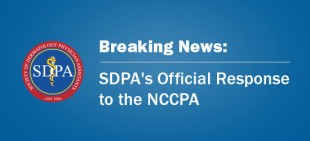
The SDPA’s Official Response To The NCCPA
The following is the SDPA’s official response to the NCCPA, as sent by SDPA President, Matthew Brunner, MHS, PA-C:
To the NCCPA Board of Directors:
In response to the NCCPA’s proposed model for a new PANRE, the SDPA respectfully submits the following official response and comments to the NCCPA Board of Directors.
The NCCPA’s new proposed PANRE model presents some concerns to our organization and the constituent PAs who are representative members of our organization.
1. The SDPA supports a recertification model that is ‘evidence based’ for PAs. Based upon the cited resources provided by NCCPA to support the proposed PANRE model, the SDPA Board of Directors finds it lacking in supporting evidence that more frequent testing of ‘core medical knowledge’ will result in better patient outcomes. In fact, the evidence in the cited resources shows instead that interactive learning has value. This would support a model that did not require testing and remedial CME but rather a ‘self assessment’ or ‘case based’ approach to recertification that would provide immediate feedback to the PA. Many physician groups are currently transitioning or exploring models for maintenance of certification that move away from testing and the SDPA would encourage NCCPA to do the same.
2. Consideration of the proposed PANRE model is coming during a precarious time for many PAs who are currently still transitioning into the new CME requirements of the ten-year cycle. Even if the new model were to be implemented five years from now, asking PAs who do not yet fully grasp the current requirements to assess yet another change is ill timed and confusing to those who hold NCCPA certification.
3. The NCCPA has stated that this model does not in anyway pose an expansion of Certificates of Added Qualification (CAQ). The SDPA finds this statement to be untrue and disingenuous. Currently the NCCPA offers 7 CAQs but has also stated that those who take one of the 10-12 specialty exams could elect to receive a CAQ if they score high enough on the specialty exam. This demonstrates an increase of 3-5 additional CAQs that would in fact be offered to virtually all those who score in the higher range. The SDPA has stated in the past and continues to assert in alignment with AAPA that we oppose CAQs and feel they represent a move away from the ‘generalist’ nature of PA certification and would eventually reduce flexibility of the profession. We continue to assert that CAQs have no place in PA certification.
4. One of the stated intentions and benefits of this model is to provide a more relevant timed testing for PAs in specialties. In reality, PAs in subspecialties not represented by the 10-12 specialty exams will continue to be subjected to exams that do not represent their area of clinical practice.
5. The SDPA also asserts the statement put forth by NCCPA that “there is evidence that conventional, didactic CME that is not interactive has little to no impact on patient outcomes or improvements in practice behaviors” contradicts the proposed model for remediation for not scoring within a defined level by requiring those PAs to complete CME rather than retesting. If this is indeed the case, how does this protect the safety of patients and improve patient outcomes?
6. The SDPA also maintains that it is the responsibility of NCCPA to provide a reasonable cost estimate to certified PAs so that the cost of the proposed model could be evaluated before deciding on moving forward with any new model of recertification.
7. Similarly, the SDPA contends that the time requirements for this new model of maintenance of certification should be evaluated and determined prior to moving forward with any new model.
Finally, we would like to point out the survey sent forth by NCCPA on February 10, 2016 was flawed in that it only allowed PAs to evaluate the current model of PANRE as compared to the proposed model of PANRE. It also did not represent an open-ended survey but rather was designed in such a manner as to ‘steer’ those taking the survey to a foregone conclusion that the NCCPA’s proposed new PANRE model was superior. This does not represent the best of practices. If the NCCPA is genuinely interested in determining what certified PAs want in a new recertification model, we would encourage a more comprehensive and inclusive process.
Respectfully Yours,
A. Matthew Brunner, MHS, PA-C
SDPA President







